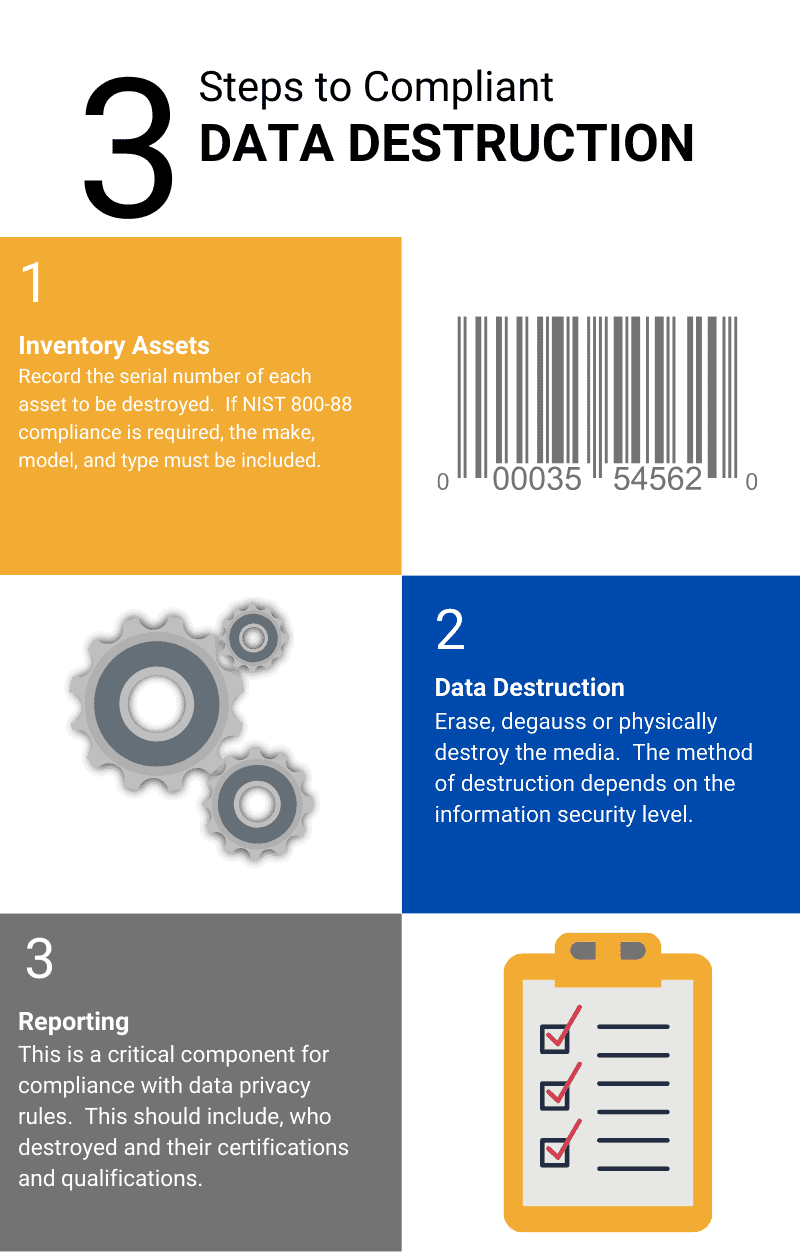Ideal Practices for Data Destruction to Strengthen Your Cyber Security Structure
Ideal Practices for Data Destruction to Strengthen Your Cyber Security Structure
Blog Article
The Essential Nature of Data Destruction in Upholding Computer System Safety Services and Protecting Versus Unauthorized Gain Access To
In an era where data violations and identity burglary are progressively prevalent, the significance of reliable data devastation can not be overemphasized. Numerous approaches, from information wiping to physical devastation, serve as critical safeguards against unauthorized accessibility.
Value of Information Damage
In a significantly electronic world, the significance of information destruction can not be overemphasized. As organizations accumulate substantial amounts of sensitive info, the potential repercussions of stopping working to properly handle and get rid of of that data come to be significantly severe. Information violations, identity theft, and company espionage posture considerable risks, underscoring the necessity of reliable data damage practices.

In addition, as technology develops, so too do the methods whereby harmful actors seek to manipulate sensitive details. Organizations should remain watchful and proactive in their information devastation methods to secure versus these evolving threats. By prioritizing information devastation, companies not only protect their properties yet likewise foster count on among clients and stakeholders, demonstrating a commitment to accountable data administration and protection practices.
Techniques of Effective Data Devastation
To make certain the permanent and total destruction of delicate information, companies can use a selection of effective approaches tailored to their details demands. One of the most common techniques is information cleaning, which involves utilizing specialized software to overwrite existing information multiple times, making healing basically impossible. This is specifically beneficial for solid-state drives and tough drives, where typical removal methods are insufficient.
One more effective method is degaussing, which uses solid magnetic areas to interrupt the magnetic domains on storage space media, making the information irretrievable. This approach is specifically suited for magnetic storage space devices, such as disk drive and hard drives.
Physical damage is also a feasible choice, involving the shredding, crushing, or incineration of storage tools. This method guarantees that information can not be recovered, making it optimal for companies handling very delicate info.

Compliance With Data Protection Regulations
Organizations have to not just concentrate on effective information damage methods however additionally ensure conformity with data protection regulations that govern just how sensitive details is taken care of and disposed of. Following these laws is crucial for protecting personal information and preserving customer count on. Rules such as the General Information Protection Policy (GDPR) in the European Union and the Health Insurance Coverage Portability and Liability Act (HIPAA) in the USA impose strict guidelines on data management, which include requirements for the secure disposal of delicate details.
To attain conformity, organizations must carry out thorough information devastation policies that align with these lawful frameworks. This consists of identifying data that needs destruction, establishing methods for safe methodsâEUR" such as shredding physical media or using software application that meets market criteria for information wipingâEUR" and keeping detailed records of destruction activities. Routine audits must be conducted to make certain adherence to these plans and to determine any type of possible areas for improvement.
Failure to adhere to information defense policies can bring about considerable lawful ramifications, consisting of significant penalties and damages to an organization's credibility. Consequently, incorporating compliance into data devastation methods is not only a lawful commitment yet also an essential element of a durable you could check here details safety and security method.
Effects of Poor Data Handling
Poor data handling can lead to severe repercussions that expand past immediate operational troubles. Organizations might encounter considerable financial losses because of data breaches, which commonly lead to expensive remediation initiatives, lawful costs, and regulatory fines. These financial ramifications can strain resources and impede growth, ultimately impacting an organization's lower line.
Additionally, bad information handling can severely damage an organization's reputation. Companions, consumers, and stakeholders may shed count on an entity that stops working to secure delicate information, bring about lowered client commitment and potential loss of service possibilities. This disintegration of depend on can take years to rebuild, if it can be restored whatsoever.
Furthermore, organizations could face legal ramifications emerging from non-compliance with data protection guidelines. Such violations might lead to fines and investigations, intensifying the financial burden and more staining the company's image.
In the world of cybersecurity, inadequate data administration methods can create susceptabilities that make systems extra susceptible to unapproved access and cyberattacks. Inevitably, these effects underscore the critical significance of executing robust information handling treatments to guard sensitive information and preserve organizational honesty.
Ideal Practices for Secure Information Disposal


First of all, information must be categorized according to its level of sensitivity. Delicate details requires more strenuous disposal techniques, such as shredding physical documents and making use of innovative software for digital data cleaning. Using certified data devastation solutions guarantees compliance with market regulations and standards.
Secondly, organizations should carry out a data disposal plan that mandates normal audits. This policy needs to lay out the treatments for information retention and devastation, making sure that outdated data is disposed of quickly and securely. Training employees on these methods is necessary to cultivating a society of safety and security recognition.
Last but not least, keeping thorough records of disposed data enhances responsibility and supplies a clear audit path. This documents needs to include the kind of data destroyed, the method utilized, and the date of disposal.
Verdict
Taking on look what i found robust techniques such as data wiping, degaussing, and physical devastation, alongside conformity with policies like GDPR and HIPAA, is essential for protecting sensitive details. Disregarding proper information disposal methods can lead to severe repercussions, including data violations and lawful repercussions.
In an age where data breaches and identification theft are increasingly widespread, the value of efficient data destruction can not be overstated. data destruction. Data violations, identity theft, and business espionage present substantial threats, underscoring the necessity of reliable information devastation practices
Compliance with guidelines such as GDPR and HIPAA requireds that companies execute rigorous data protection steps, including the protected devastation of data at the end of its lifecycle.
By focusing on data devastation, business not just safeguard their properties however also foster trust fund amongst clients and stakeholders, showing a commitment to accountable data monitoring and safety and security practices.
Organizations must not only focus on reliable information destruction techniques but also make sure conformity with data defense regulations that govern exactly how sensitive information is managed and disposed of.
Report this page